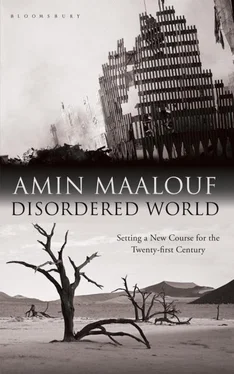This approach has the same value as all theories: each term, when examined closely, can give rise to criticisms, but the vision as a whole is thought-provoking. Especially when considered in the light of the last few decades. The acceleration has been dizzying, brutal and inevitably traumatic. Societies which had followed different courses throughout their histories, which had developed their beliefs, languages, traditions, feelings of belonging, their own sense of pride, found themselves catapulted into a world in which their autonomous identity was jostled, eroded and seemed under threat.
Their reaction has sometimes been violent and disordered, like that of a drowning person whose head is already under water and who struggles without hope or discrimination, ready to drag down with him anyone his hands grab hold of, whether would-be rescuers or aggressors.
From the end of the Cold War to the end of the 1980s, the evolution described by Toynbee towards an integrated civilisation progressed at a quite different pace and in an appreciably transformed strategic environment.
One government, that of the United States, found itself taking on the role of de facto global authority; its value system became the universal norm, its army the planet’s police force, its allies vassals and its enemies outlaws. It is a situation without historical precedent. Certainly in the past there have been powers which at their height achieved some sort of primacy; which, like the Roman Empire, dominated the known world or extended so far that it was said the sun never set on their territories, such as the Spanish empire in the sixteenth century or the British empire in the nineteenth. But none of them possessed the technical means which would have allowed them to intervene at will all across the globe or to thwart the emergence of rival powers.
This process, which might have stretched out over several generations, was astonishingly accomplished in the space of a few short years. The whole world is now a unified political space. Toynbee’s third phase has come to an abrupt, premature end and a fourth has begun which looks set to be stormy, troubling and eminently dangerous.
All of a sudden, the question of power and legitimacy has arisen at global level for the first time in history. If this essential fact is rarely expressly mentioned, it is constantly present in what is not said, in recriminations and at the heart of the most brutal conflicts.
In order for different peoples to accept the authority of a sort of global government, that government has to possess a legitimacy in their eyes other than that which stems from its economic and military power. And in order for individual identities to become part of a much larger identity and for particular civilisations to integrate into a planetary civilisation, it is imperative that the process take place in a context of equality, or at the very least of mutual respect and shared dignity.
I deliberately mixed different aspects in my previous sentences. The reality of today’s world is only comprehensible if all these facets are constantly borne in mind. From the moment at which one civilisation predominates, carried by a single global superpower, transcending civilisations and nations can no longer happen in an atmosphere of serenity when a single civilisation prevails, led by a single global superpower. Peoples who feel themselves threatened with cultural annihilation or political marginalisation inevitably listen to those who call for resistance and violent action.
Unless and until the United States persuades the rest of the world that its pre-eminence possesses moral legitimacy, humanity will remain under siege.
As I write, an image comes into my mind which is trivial yet unforgettable: that of a polling station in Florida during the US presidential election in November 2000. A scrutineer is holding a ballot paper up to the light to work out from the perforations and twists in the paper whether Al Gore or George W. Bush should receive the vote.
Like millions across the world, I was hanging on the result of this count and the legal quarrel that accompanied it. In part, I admit, it was out of curiosity at watching an exciting political soap opera, but mainly it was because my own future and that of my nation were at stake in these elections. Back then I had an inkling of it, and today I am certain: that vote in Florida was to change the course of history in my native land, Lebanon.
I chose this spontaneously as my first example, as it closely affected me. I could have begun with many other more prominent examples, whose implications for the whole planet seem more obvious. For example, it is reasonable to suppose that the attacks on 11 September 2001 would still have taken place if Al Gore had been in the White House rather than George W. Bush. But it is also reasonable to suppose that Washington’s reaction would not have been the same. There would inevitably have been a ‘war on terror’, but with different priorities and slogans, and different methods and alliances. There would probably have been less determination, but also fewer mistakes. The president would not have spoken of a ‘crusade’ nor an ‘axis of evil’, and prisoners would not have been detained in Guantanamo. The war in Iraq would probably not have taken place. That would have made life very different for the people now caught up in it, as well as for US relations with the rest of the world. It is also probable that the Syrian army would not have had to leave Lebanon in 2005 and that the confrontations taking place in my country would have taken a different turn.
If the Democrats had won in November 2000, several other important issues might also have been handled differently — climate change, for example, or stem-cell research, or the role of the United Nations. This would have had significant consequences for the future of the planet. But it would be risky to take these hypotheses much further, and pointless to try to determine whether the world would now be in a better or worse state. I have pondered that famous vote in Florida over the years, and sometimes come to the conclusion it was disastrous and sometimes that it was providential.
In any case, one thing is certain: what the voters in Tampa and Miami were voting on in that symbolically significant first year of the new millennium was not just the future of the American nation; it was in large measure the future of every other nation as well.
The same thing could also be said of the next two presidential elections, in the course of which we experienced extreme situations. In 2004, the whole world wanted President Bush to be beaten, but his fellow citizens chose to re-elect him; the disaffection between America and the rest of the world was then at its height. Conversely, in 2008, all the nations on earth were in love with Senator Obama and when the vote went in his favour there was a torrent of admiration — entirely justified in my view — for the United States, its people, their political system and their ability to manage ethnic diversity. Such a convergence of opinion — linked to Obama’s rhetoric, his African origins and the world being tired of the Republican administration — will not recur any time soon. On the other hand, it is highly likely that every US election henceforth will give rise to a global psychodrama.
That clearly poses a problem. I would even go as far as to say that beneath the anodyne, trivial exterior, the repercussions of US presidential contests are one of the hidden aspects of the political and moral disorder which characterises our times.
Before going any further, I should take account of two objections to which these thoughts could give rise. It is true, one could argue, that the US president is powerful today. His political decisions affect the fate of the whole planet, and therefore those who elect him find themselves in a role which is not theirs by right, since the choices they make so often prove decisive for the future of the peoples of Asia, Europe, Africa and Latin America. In an ideal world, it should not be thus. But why get worked up over a problem without a solution? After all, the people of Colombia, Ukraine, China and Iraq can’t be granted the right to vote in US presidential elections.
Читать дальше












